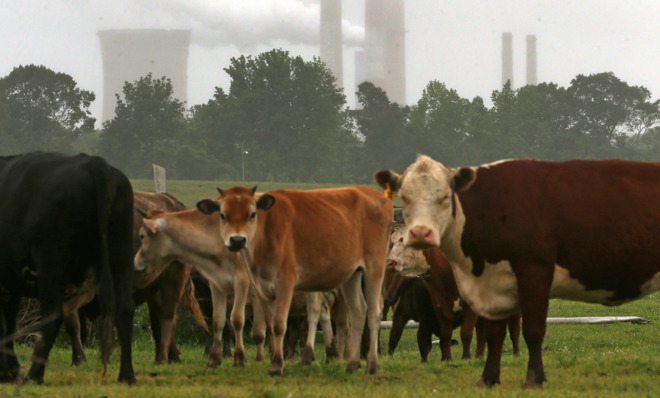Why conservatives should be stoked about Obama's new environmental rules
If the EPA's new regulations for coal-powered plants are struck down, you can expect even tougher restrictions


A free daily email with the biggest news stories of the day – and the best features from TheWeek.com
You are now subscribed
Your newsletter sign-up was successful
This week, President Obama unveiled the most important policy of his second term: New regulations on existing coal-fired power plants, which amount to the U.S. government's most concerted effort yet to roll back climate change. Undoubtedly, business and conservative groups are already planning an all-out war against these new rules in the courts. But there is reason for them to pause. If the rules are struck down, then they will likely face much more onerous and expensive regulations in short order.
Obama's goal is to cut coal-fired power emissions by 30 percent by 2030, from a 2005 baseline. If implemented with decent speed, the rule ought to put the U.S. on track to meet the goals of the 2009 Copenhagen Agreement, which proposed a 17 percent reduction in emissions by 2020. In today's political context, it's an excellent start.
But this regulation is not just a bold effort that pushes emissions reductions about as far as could be expected through the EPA — it is also a bold gambit in the legal sense. As Jonathan Chait explained in an excellent post on the legal background, there is a trade-off between the effectiveness of the policy and the legal standing of the rules, which is to say that the Obama administration is pushing the envelope.
The Week
Escape your echo chamber. Get the facts behind the news, plus analysis from multiple perspectives.

Sign up for The Week's Free Newsletters
From our morning news briefing to a weekly Good News Newsletter, get the best of The Week delivered directly to your inbox.
From our morning news briefing to a weekly Good News Newsletter, get the best of The Week delivered directly to your inbox.
The legal context is the Clean Air Act, which was signed by President Nixon, and more specifically amendments that were signed by the first President Bush. That legislation commands the EPA to regulate carbon pollution, a directive that was upheld by the Supreme Court in the 2007 case Massachusetts v. EPA.
The legal machinery of executive branch regulations is such an incomprehensible omnishambles that it will take years, and probably a Supreme Court decision, to know if the latest rule is on firm ground or not. But the problem is that the Clean Air Act was designed around pollutants that have specific negative effects on people's health, like sulfur dioxide, ozone, and the like. These are amenable to traditional bureaucratic regulations (like a mandate to get the lead out of gasoline), since they are typically byproducts that can easily be captured or eliminated.
But that model is less amenable to pollution from coal-fired power, since there is no way to produce the energy without burning the coal and producing carbon dioxide. (The only option is to store the CO2 underground, a method that is still in the early, experimental stages of development.)
One option would be to straight-up ban coal-fired emissions tomorrow, but that would obviously entail enormous economic disruption. That's why Obama's first climate push came in the form of a cap-and-trade bill, which would have allowed much more flexibility in terms of adapting to lowering emissions. (It was blocked by Republicans.) The latest rule should also achieve most of the flexibility that one would get under a cap-and-trade system. It allows wide latitude for states to meet their carbon goals. Among other options, they can join existing regional cap-and-trade networks, jack up their portfolios of renewable or nuclear, or join a multistate network.
A free daily email with the biggest news stories of the day – and the best features from TheWeek.com
But the Clean Air Act was not designed with this kind of sweeping vision in mind, which makes the rule legally vulnerable. Ironically, a maximal Big Government regulation would be on much sturdier legal foundation.
On the other hand, if carbon barons and their conservative brethren successfully beat back this rule, they may well face precisely that kind of old-fashioned, onerous regulation, which would be much more damaging to their interests in the long term.
I have my doubts that conservatives can manage this kind of tactical analysis. These days their primary consideration is how best to express their outrage, and they have repeatedly suffered strategic defeats from demanding total victory.
But it would be in their interest to bear it in mind. The politics of climate change are changing fast. Compare Kentucky coal miners' small share of total jobs in the state to the number of alarmed residents of the tidewater region in Virginia, who are just starting to realize that they will have to spend billions of dollars in the coming decades to keep from being swamped, thanks to rising sea levels.
It's highly possible that in five years a simple rule banning all coal power will seem sensible — or even urgent.
Ryan Cooper is a national correspondent at TheWeek.com. His work has appeared in the Washington Monthly, The New Republic, and the Washington Post.
